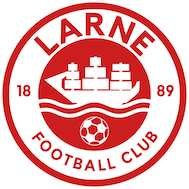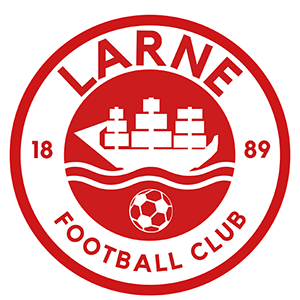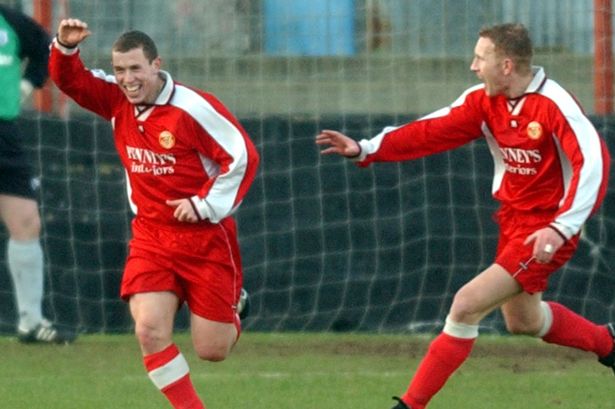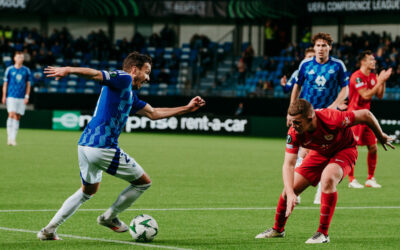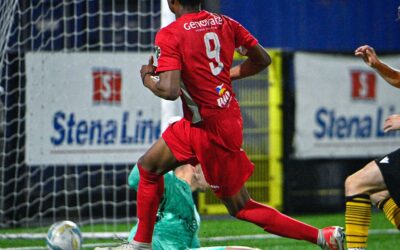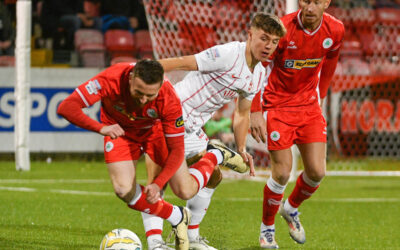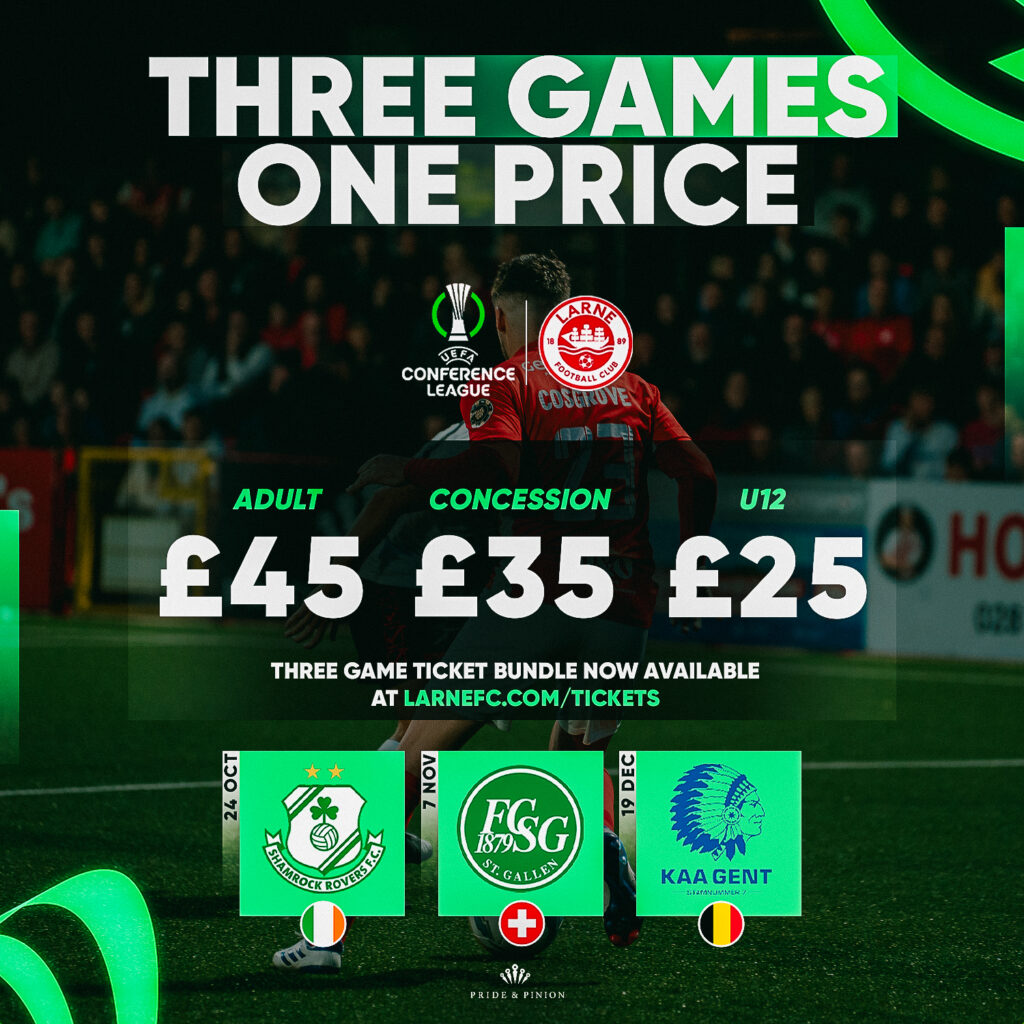Mark Dickson always preferred to let his football do the talking. Football changing rooms tend to be packed with jokers, extroverts and those not afraid to put forward an opinion – whether it has been asked for or not.
Despite being one of the most decorated forwards of his generation and enjoying a clean sweep of medals available to him, Mark Dickson has always been known as one of the quiet men in Irish League football.
He enjoyed some incredibly significant moments in the five years he wore the Larne shirt, from 2001 to 2006. Between bagging the goal to clinch promotion to the Premiership and scoring the goals which saw us reach our last two major cup finals – the League Cup decider of 2003 and Irish Cup final in 2005, Mark Dickson is synonymous with that period of our history.
From Inver Park, he went on to enjoy major success at boyhood club Linfield, and scored a spectacular winner in another Irish Cup finale, this time for Crusaders. Despite all of this, you won’t find ‘Dicko’ shouting from the rooftops about his time in the game.
Going back to where it all began, Mark’s football pedigree was spotted at an early age and it earned him a two-year apprenticeship at Northampton Town.
“I loved it,” Dickson admitted.
“Training and playing every day is something you dream of and I was able to do that from 16 to 18-years-old. I think I was spotted playing underage football and the scout had seen me at the Milk Cup as well – it was a great time at Northampton.”
After Mark’s second season with ‘The Cobblers’ he was given the news that all young footballers fear, when he was told his contract wasn’t going to be renewed. After taking stock, it meant a move back home and an opportunity with Newry City, then high fliers in the Premiership, presented itself.
Initially things went well under then boss Alfie Wylie, scoring in an opening day win over Crusaders, at the start of the 2000-01 season.
“It was a big change for me at the start,” he said.
“When you come back to play in the Irish League, you’re not only playing, but you’re also working during the day and training twice a week, so it’s a big difference when you come initially.
“I was also straight into men’s football and that brings about a big difference when you’ve been playing against other players of your own age group. Things started well enough, but I had 18 months at Newry before I wanted to move on to play regular football.”
Step forward Tommy Kincaid, who was halfway through his first season as a manager, having taken the reins at Inver Park. Kincaid made the step up from assistant manager at Lisburn Distillery and was beginning to put his stamp on things. Having spoken to Dickson, he was keen to land his man.
“I was out of the team at Newry and I knew dropping down into the First Division might give me a better chance of playing more regularly” Mark recalled.
“I came to training and enjoyed it, so I was keen to sign and I did in the December.
“It felt like Larne were a club who were building for promotion, and even though it didn’t happen at the end of that first season we were moving towards it. It was a very competitive division, you had the likes of Ballymena, Bangor and obviously ourselves.”
With Larne on an upwardly mobile trajectory, the encouraging news came in the summer of 2002 that a restructure of the Irish League meant that half of the then First Division – four of the eight teams – would be promoted to the revamped top flight. The objective was clear – avoid finishing in the bottom half and promotion was assured. In true Larne fashion, things went right to the wire.
Having been in the top half for virtually all of the season, it came down to a last day shoot out between Larne and Bangor at Clandeboye Park. The hosts, Bangor, were sitting in fifth and needed a victory to leapfrog Kincaid’s men, while a point would do the job for Larne.
Mark is clear in his mind what saw them through that tense afternoon of Tuesday 22nd April 2003.
“We had a really good team spirit in that side,” he said.
“There was a really good togetherness and it meant that we fought for every ball. Tommy was good at lifting the pressure off us, even though there probably was a lot riding on the game for the club.
“In the end we got the draw we needed, but Bangor pushed really hard for the win they needed too. Experienced players really helped us to get through that, people like John McKinstry, Tommy McDonald and Neil Candlish.”
Of course, it was Dickson who got the goal which set Larne on their way, a glancing header at the opposite end of the ground to a large travelling support from Larne.
He said: “I just remember it was a great cross in from Neilly (Candlish) and I managed to get across the defender and head it in.
“There were great celebrations at the end, Larne had a big crowd up and I remember the great reception we got back at the club too.
“Looking back on it, I felt I had made the right decision in coming to Larne, because we managed to get back to the Premiership together.”
From there, Larne began life as Premiership club in the 2003/04 season and it was an eventful start back to life mixing it with the big boys.
“We really enjoyed a great first season back in Premiership,” he said.
“We went into almost every game as underdogs, which really suited us because we could hit a lot of teams on the counter attack. Before the the League Cup final, we were sitting fourth in the table I think, and we had started really well.
“The early part of that season obviously involved getting to that final. It was a real shame not to have silverware to look back on with my time at Larne, but it just wasn’t meant to be, with that defeat to Cliftonville on penalties.”
With Tommy Kincaid moving on and John Devine taking over until the end of the season, it was soon time for a fresh face in the form of Jimmy McGeough, who took over for the 2004/05 season.
Dickson’s hat-trick in the quarter-final replay and winner from the penalty spot against Ballymena in the last four, all proved pivotal as Larne ended the season in the Irish Cup final against a strong Portadown side. Despite Neil Ogden’s early goal, it was to end in a 5-1 rout for the Ports.
“When Jimmy came in he moved me from the right to put me up front,” Mark added.
“There were a lot of young players brought into the side and they really helped bring a freshness, playing without fear. Getting to the Irish Cup final at the end of that season was a brilliant achievement. Scoring as early as we did probably angered them.
“They had some top players, who all played well on the day. You had players like Mickey Collins, Vinny Arkins and Gary Hamilton.”
One more season followed at Inver Park, and Dickson was paired with Gary McCutcheon in one of the strongest partnerships the club has seen in recent times.
“Gary McCutcheon was quality on the ball,” he recalled.
“It allowed me to run in behind, which was great, but we had other experienced players in the team around that time, with the likes of Neil Ogden and Stevie Small. I think the only thing wrong with us around that time was having to change manager nearly every season, and it meant starting with a new core of five or six players each time.”
Interest in the striker grew with every passing season, with Cliftonville and Ballymena among the clubs heavily linked. However, it was in the summer of 2006 he got the move he really wanted when David Jeffrey’s Linfield came calling.
“I loved playing for Larne, I really love going back to see a lot of the familiar faces at the club and it brings back a lot of good memories,” he said.
“Being a Linfield supporter, it was a dream come true to be able to sign for them, and have some success along the way. I had the chance to play for Crusaders as well and the Irish Cup win was a big highlight there too.”
A final season followed at Donegal Celtic, but a combination of having to working on Saturdays as Postman and a troublesome knee injury, brought the curtain down on his playing days in 2011.
Two Premiership titles, three Irish Cups, one League Cup and one County Antrim Shield were secured during a glittering Irish League career. In the end, there was plenty to shout about for one of the Irish League’s quiet men.
